

10 Letters We Dropped From The Alphabet. Where did English come from? - Claire Bowern. There are two other TED-Ed lessons related to this topic: How languages evolve and How did English evolve?
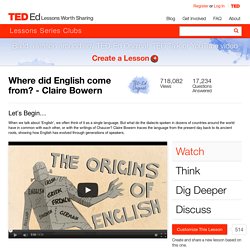
(a lesson that fills in some of the details that we omit here due to the fact that the focus of this lesson was further in the past). There is still a great deal of debate about Indo-European, most importantly about the location of the homeland. To read more about this debate, there are classic books by Mallory and Renfrew, as well more recent works by Anthony. Then, read these articles by Bouckaert et al.
At the same site, watch this movie that shows one hypothesis about how Indo-European languages expanded. English language 'originated in Turkey' Modern Indo-European languages - which include English - originated in Turkey about 9,000 years ago, researchers say.
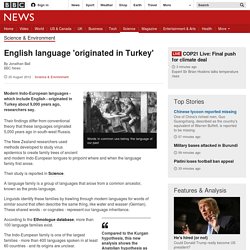
Their findings differ from conventional theory that these languages originated 5,000 years ago in south-west Russia. The New Zealand researchers used methods developed to study virus epidemics to create family trees of ancient and modern Indo-European tongues to pinpoint where and when the language family first arose. Their study is reported in Science. A language family is a group of languages that arose from a common ancestor, known as the proto-language. Linguists identify these families by trawling through modern languages for words of similar sound that often describe the same thing, like water and wasser (German). The History of English (An Overview)
The History of English - How New Words Are Created. The drift of word meanings over time often arises, often but not always due to catachresis (the misuse, either deliberate or accidental, of words).
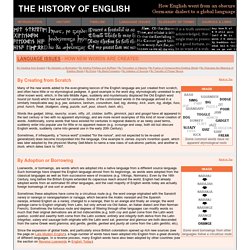
By some estimates, over half of all words adopted into English from Latin have changed their meaning in some way over time, often drastically. For example, smart originally meant sharp, cutting or painful; handsome merely meant easily-handled (and was generally derogatory); bully originally meant darling or sweetheart; sad meant full, satiated or satisfied; and insult meant to boast, brag or triumph in an insolent way. A more modern example is the changing meaning of gay from merry to homosexual (and, in some circles in more recent years, to stupid or bad).
Some words have changed their meanings many times. Some words have become much more specific than their original meanings. Some words came to mean almost the complete opposite of their original meanings. English is Great. 25 maps that explain the English language. English is the language of Shakespeare and the language of Chaucer.
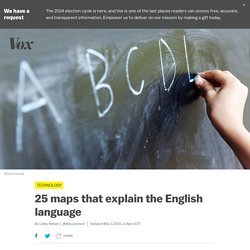
It’s spoken in dozens of countries around the world, from the United States to a tiny island named Tristan da Cunha. It reflects the influences of centuries of international exchange, including conquest and colonization, from the Vikings through the 21st century. Here are 25 maps and charts that explain how English got started and evolved into the differently accented languages spoken today. The evolution of the English language. TED-Ed and Mysteries of Vernacular. Do you speak Uglish? How English has evolved in Uganda.
Please don’t dirten my shirt with your muddy hands.

Stop cowardising and go and see that girl. Don’t just beep her again, bench her. Typos? No, we’re speaking Uglish (pronounced you-glish), a Ugandan form of English influenced by Luganda and other local dialects, which has produced hundreds of words with their own unique meanings. Some will be immediately obvious to English speakers: dirten, meaning to make dirty; cowardising, to behave like a coward. Others offer small insights into youth culture: beep – meaning to ring someone but to hang up quickly before the person answers. Now, Bernard Sabiti, a Ugandan cultural commentator has recorded these colloquialisms in a new book which attempts to unlock what he calls “one of the funniest and strangest English varieties in the world”. Working as a consultant for international NGOs, Sabiti kept being asked “what kind of English do Ugandans speak?”
The History of the English Language ( Visual) Literary Periods Timeline. Etymology: Languages that have contributed to English vocabulary over time. In Borrowed Words: A History of Loanwords in English, I examine how words borrowed from different languages have influenced English throughout its history.
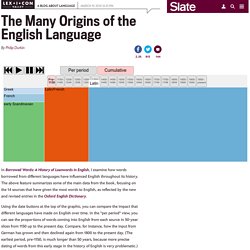
The above feature summarizes some of the main data from the book, focusing on the 14 sources that have given the most words to English, as reflected by the new and revised entries in the Oxford English Dictionary. Using the date buttons at the top of the graphic, you can compare the impact that different languages have made on English over time. In the "per period" view, you can see the proportions of words coming into English from each source in 50-year slices from 1150 up to the present day. Compare, for instance, how the input from German has grown and then declined again from 1800 to the present day. (The earliest period, pre-1150, is much longer than 50 years, because more precise dating of words from this early stage in the history of English is very problematic.)
A version of this post appeared on Oxford Dictionaries. Language Timeline. The English language is a vast flea market of words, handed down, borrowed or created over more than 2000 years.
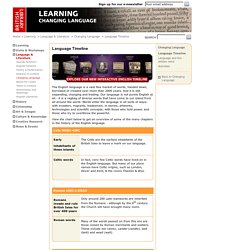
And it is still expanding, changing and trading. Our language is not purely English at all - it is a ragbag of diverse words that have come to our island from all around the world. Words enter the language in all sorts of ways: with invaders, migrants, tradesmen; in stories, artworks, technologies and scientific concepts; with those who hold power, and those who try to overthrow the powerful. Timelines: English Pilot Project. Chronology: History of English. History - British History in depth: Ages of English Timeline. Key Events in the History of the English Language.
The History of English - Timeline. Key Events in the History of the English Language. Timeline of the English Language. History - British History in depth: Ages of English Timeline. History of English. The figure below shows the timeline of the history of the English language.
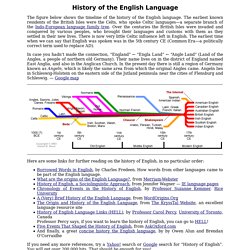
The earliest known residents of the British Isles were the Celts, who spoke Celtic languages—a separate branch of the Indo-European language family tree. Over the centuries the British Isles were invaded and conquered by various peoples, who brought their languages and customs with them as they settled in their new lives. There is now very little Celtic influence left in English. The earliest time when we can say that English was spoken was in the 5th century CE (Common Era—a politically correct term used to replace AD).
In case you hadn’t made the connection, “England” ← “Engla Land” ← “Angle Land” (Land of the Angles, a people of northern old Germany). Here are some links for further reading on the history of English, in no particular order: If you need any more references, try a Yahoo! Copyright © 2003–2007 Daniel M. The Story of English episode 9 - Next Year's Words - Part 1 / 7. The Story of English episode 8 - The Loaded Weapon - Part 2 / 7. The Story of English episode 7 - Muvver Tongue - Part 1 / 7. The Story of English episode 6 - Pioneers O Pioneers - Part 1 / 7. The Story of English episode 5 - Black on White - Part 1 / 7. The Story of English episode 4 - The Guid Scots Tongue - Part 1 / 7. The Story of English episode 3 - A Muse of Fire - Part 1 / 7.
The Story of English episode 2 - The Mother Tongue - Part 1 / 7. The Story of English episode 1 - An English Speaking World - Part 1 / 7. LEGO History of the English Language. The Origin of Old English. History of English - From IE to OE. English as Language of the World (TED, 2009) Anglo-Saxon - The History of English (1/10) History of English (combined) English History Channel. The Evolution of English. The Origins, History and Evolution of the English Language - OE, ME, EME and AE.
How languages evolve - Alex Gendler. Evolution of the (English) Alphabet - part 2. Evolution of the (English) Alphabet. The Evolution Of English - Part 2. The Evolution Of English - Part 1. The evolution of the English language. The Evolution of English. How English Evolved Into a Modern Language. How English evolved. The evolution of the English Language. The History of English (An Overview)